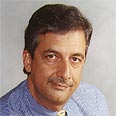
'Aren't we all Americans?'
Ray Hanania takes humorous look at Arab-American community during Six Day War
It was during the 1967 Arab-Israeli war that I found myself forced to “take a stand” with my classmates.
Of course, I was only 13 at the time, and thankfully the battle only lasted six days, so our friendships eventually returned to normal.
But during that six-day war, my friends, Jewish and non-Jewish, demanded to know, “What’s your nationality?”
I didn’t even know what the word “nationality” meant.
“I’m an American,” I said perplexed by the question. “Aren’t we all?”
They surrounded me, the only Arab in the school in a neighborhood on Chicago’s southeast side best known for its large and diverse immigrant community.
We lived in a neighborhood on Chicago’s Southeast side called South Shore Valley, which was comprised of “Pill Hill,” where all the rich doctors lived, and “Bill Hill,” where all their cash-strapped patients lived.
Ironically, one of the largest immigrant communities consisted a pocket of Jews and Arabs who all lived together, sharing life as if nothing was happening up until then between their peoples 9,000 miles away.
I think I may have been the first Palestinian (ever) to join a Jewish Community Center, which had the most community activities, programs and a large swimming pool.
So I was surprised when the kids confronted me that June afternoon right after school. I knew there was a war going on because my father and mother, whose families still lived in Jerusalem and Bethlehem, were upset about it over dinner.
But I didn’t read newspapers, so how was I to know?
That evening, after a long rant from my father about the unfairness of the Arab-Israeli conflict and the mounting tragedy on the Palestinians (terms still distant to me), I asked my dad, “What’s a nationality?”
'Dad comes from cereal'
Dad’s eyes widened and he was expressionless for the first time in a long time. He seemed concerned. Mom and dad hugged, and for a moment I thought I had to go to the doctor to get a shot, or something.
“Don’t tell them you are Palestinian,” dad warned as mom nodded her head in agreement. Neither parent was blinking and that was another sign about the severity of the situation.
“That’ll only ruin his chances of going to college,” my mom sighed. “He’ll have to run a grocery store. He won’t be a doctor. Ya Rubbeee!”
Dad put his arm around my mother’s shoulders and they both leaned in to me, as dad spoke.
“Listen, Ray. Tell the kids at school that you are Syrian,” dad said.
“Yea. Syrian,” mom repeated.
“Or, maybe that you are Lebanese,” dad said.
“Yea. Lebanese,” mom repeated again.
I didn’t know what the word “nationality” meant, and now I was supposed to learn two more words I had never heard before?
The next day after school, the kids surrounded me again and demanded to know, “What’s your nationality?”
I looked a little apprehensive, and said with as much strength that I could muster over a sudden plague of the stutters, “Well, my da, da, da, dad says I’m cereal … But my ma, ma, ma, mom is a Lesbian.”
That summer, all my friends wanted to be cereal, too. We couldn’t have been closer.
Ray Hanania is a Palestinian-American syndicated columnist, peace activist and standup comedian who was raised in Chicago. Hanania has been a champion of Palestinian rights while also advocating peaceful compromise. He is from a Christian family; his father is from Jerusalem, his mother from Bethlehem. His wife and son are Jewish. He is the founder of "Comedy for Peace," which hopes to bring joint Palestinian and Israeli comedy appearances to Israel and Palestine. He can be reached through the group's website. This new column is exclusive for Ynetnews










